Round 31 project details announced
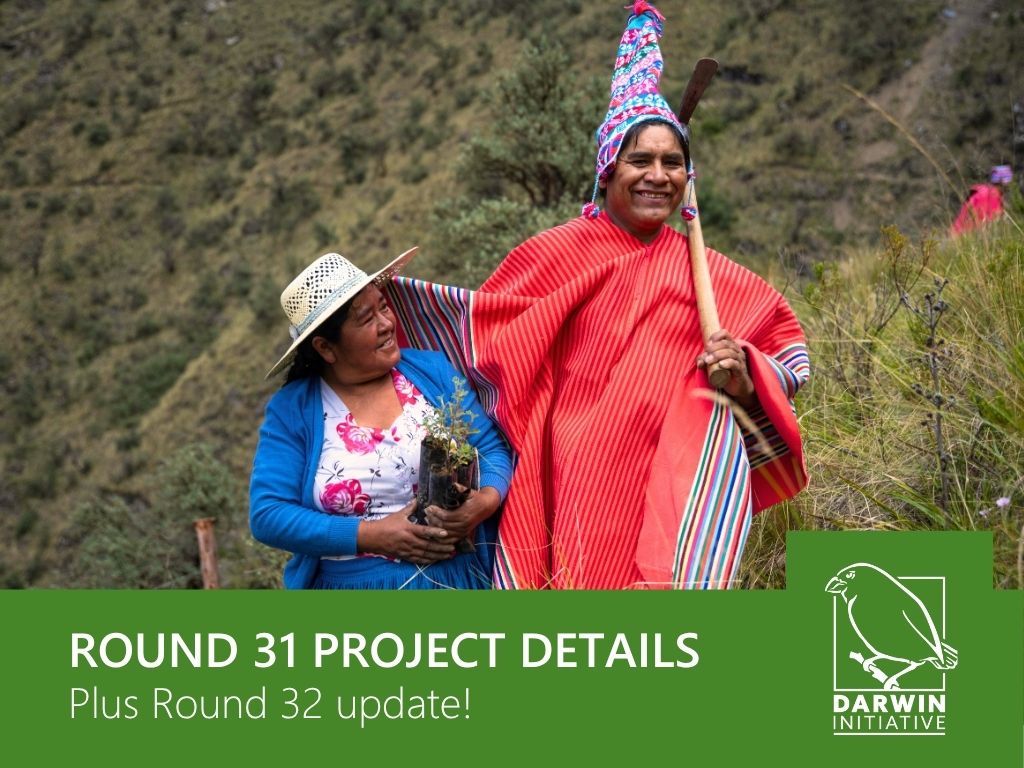
Planting native Polylepis tree saplings in Tunari National Park, Bolivia. Credit - Asociación Armonía. New Extra project (DAREX014).
New Darwin Initiative project details released and an update on the next funding round
Congratulations to the 47 new Darwin Initiative projects that have recently been awarded funding under Round 31. Grants have been given to 3 Extra projects, 19 Main projects, 9 Innovation projects and 16 Capability & Capacity projects.
Working across 36 countries, projects span across multiple ecosystems and species, from the forests of Papua New Guinea - home to the endemic Matschie's tree-kangaroo – to the coffee farms of Kenya. Projects cover a range of themes, from training Indigenous youth in India to lead conservation projects, to piloting a tool in southern Africa that monitors the enabling conditions for community-led conservation, to empowering lawyers in the Philippines to use existing laws to remedy environmental harm.
Read on to learn more about projects being funded under each scheme.
Darwin Initiative Extra
Darwin Initiative Extra provides grants between £800,000 and £5 million to projects lasting between 2 and 5 years. This scheme supports projects which have previously been supported under the Biodiversity Challenge Funds to build on proven results through a defined pathway to scale. These projects are grounded in evidence, strategically planned for growth, and capable of delivering meaningful, lasting results for people and nature.
Under Round 31, we are funding three new Extra projects.
In Bolivia, the ‘Sustainable Financing for Protected Area Management in Bolivia’s Andean foothills’ project (DAREX015), will strengthen protection and sustainable management of 4 million ha of forests and watersheds, while improving livelihoods and resilience in neighbouring communities.
In Nepal, the ‘Upscaling pollination to enhance biodiversity and human welfare in Nepal’ (DAREX013) project is transforming pollinator conservation by uniting farmers, scientists, and policymakers to restore crops, livelihoods, and ecosystem health across the Himalayas.
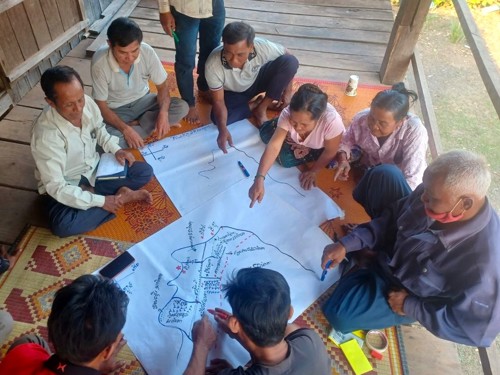
The third new Extra project, led by BirdLife International, is working across multiple countries around the world including Uganda, São Tomé and Príncipe, and the Philippines. The ‘BirdLife International Forest Impact Accelerator Plus’ project (DAREX014) aims to scale up sustainable finance initiatives that drive nature-based solutions, protect biodiversity, and reduce poverty across 1 million ha of forest landscapes. Project Manager, Christina Van Winkle, shared the following:
“We are thrilled to receive this major grant from the UK's Government's Darwin Initiative to scale up BirdLife's Forest Impact Accelerator. Thanks to this transformative award, we can empower our national partner organisations to design and develop sustainable finance solutions for critically important tropical forests, biodiversity, and local communities. Over the next five years, we aim to create greener local economies through nature-based solutions and generate lasting conservation impact for generations to come.”
Darwin Initiative Main
Darwin Initiative Main projects last from 1 to 5 years and are awarded between £100,000 and £800,000 to deliver strong evidence-driven results achieving lasting impact for biodiversity conservation and poverty reduction, and have the potential to scale further.
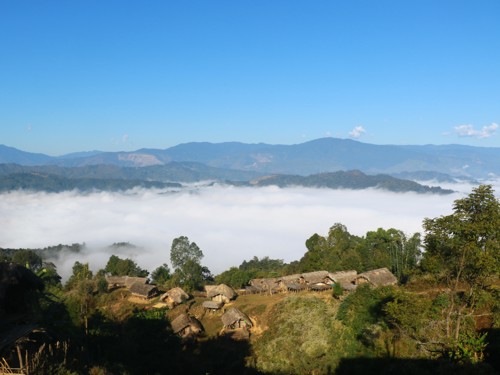
A diverse portfolio of new projects has been awarded funding, from community-led landscape restoration in Madagascar, to developing innovative conservation payment schemes to foster human-wildlife coexistence in Zambia, to supporting Indigenous communities in Myanmar to establish a 50,000 ha community conservation area that protects wildlife through beliefs-based conservation.
In Honduras, Manomet Conservation Sciences will lead the new Main project ‘Climate resilient salt and shorebird conservation in San Lorenzo, Honduras’ (32-003) working to safeguard both the livelihoods of artisanal salt producers and the habitats of shorebirds, while promoting scalable conservation approaches. Project Leader, Julia Salazar, explains the importance of the funding:
“I come from a family of artisanal salt producers and am proud to be the third generation continuing this tradition. With the support of the Darwin Initiative, small producers in San Lorenzo will strengthen their climate resilience, protect our mangroves and shorebirds, and make artisanal salt production more visible and valued — both in Honduras and around the world.”
Darwin Initiative Innovation
Darwin Initiative Innovation projects aim to explore and test novel, evidence-based approaches that, if proven effective, can be scaled to achieve significant and lasting outcomes for biodiversity conservation and multidimensional poverty reduction. This scheme grants funding from £10,000 up to £200,000 with projects lasting from 1 to 2 years.
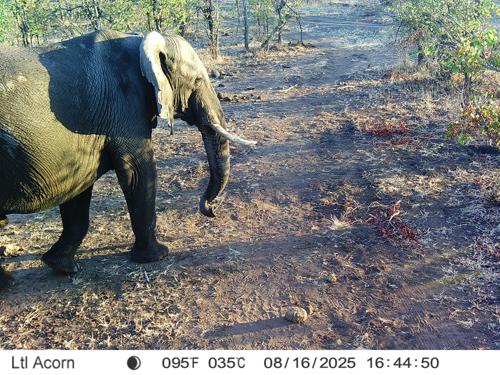
Innovation projects explore various topics; from partnering with coastal communities in Timor-Leste to identify and protect seagrass ecosystems through the creation of drone imagery and mapping, to using AI-enabled camera systems to reduce human-wildlife conflict in Zimbabwe, these projects will look beyond the familiar to protect nature and uplift communities.
‘Inside-out: Building a Framework for ranger GESI’ (DARNV034) is a newly funded Innovation project working to develop good practice for rangers across Southern Africa, led by Wildlife Crime Prevention. Lindie Botha, Project Leader and Technical Lead for implementing partner Conservation Synergies, offered the following:
“We are grateful to receive the support of the Darwin Initiative for ‘Inside-out: Building a Framework for ranger GESI’. Our project aims to strengthen gender equity and social inclusion (GESI) among rangers across protected areas in Southern Africa by gathering actionable evidence and co-developing practical, context-sensitive good practices. As rangers’ roles become more complex and demanding, fostering safe and inclusive working conditions and ultimately, more resilient organisations, has never been more crucial. We look forward to sharing our learning and shaping a more equitable future for conservation in Southern Africa.”
Darwin Initiative Capability & Capacity
Darwin Initiative Capability & Capacity supports projects lasting between 1 and 2 years. These projects aim to strengthen the skills, resources, and institutional capacity of national and local organisations, to effectively implement initiatives that achieve both biodiversity conservation and multidimensional poverty reduction.
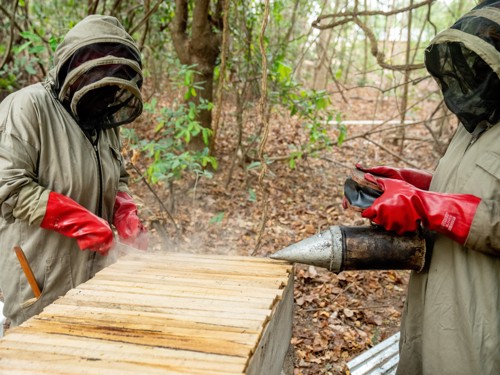
New Capability & Capacity projects awarded under Round 31 range from encouraging community involvement in the management and recycling of abandoned fishing gear in Indonesia, to creating training videos to help conservationists across Africa to deliver forest-based beekeeping projects that sustain both livelihoods and biodiversity, to strengthening plant diversity conservation in Latin America through the improvement of seed bank capabilities.
One of the newly funded Capability & Capacity projects is ‘Strengthening NGOs for Community-based Gibbon Conservation in India and Bangladesh’ (DARCC068) led by People Resources and Conservation Foundation (PRCF). This project aims to enhance the capability and capacity of conservation organisations in Bangladesh and Northeast India to scale their community-based conservation programmes, collaborating on transboundary gibbon conservation, and empowering local communities in biodiversity protection and natural resource management.
Sinan Serhadli, Project Coordinator and South Asia Regional Coordinator at PRCF, outlines the scope of the project:
“The People Resources and Conservation Foundation is honoured to receive support from the Darwin Initiative for this collaborative effort to strengthen the capacity of local conservation organisations in Bangladesh and Northeast India. Through this project, we aim to enable the Creative Conservation Alliance in Bangladesh and Conservation Initiatives in Northeast India to deliver impactful, community-based conservation for the Western Hoolock Gibbon - the only ape species of South Asia and one of the most threatened globally. By investing in local leadership and Indigenous and local community partnerships, we hope to build lasting conservation networks that protect both biodiversity and cultural heritage across borders, while exchanging knowledge and experience with our local partners.”
A full list of successful Round 31 Darwin Initiative projects can be found here.
The Biodiversity Challenge Funds team extends a huge congratulations to all the newly awarded projects, and we look forward to seeing your progress!
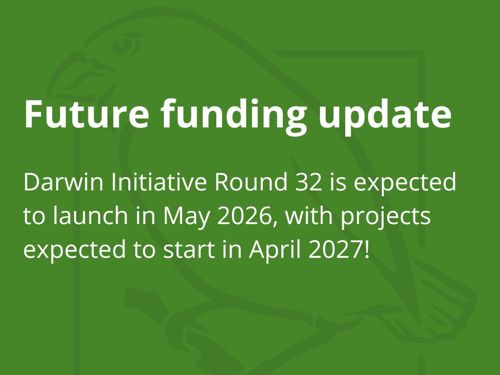
We are also excited to share a future funding update – Darwin Initiative Round 32 is expected to launch in May 2026, with projects expected to start in April 2027! We will share more information as soon as we can, so keep an eye on our website and social media for further updates.
 Back
Back